Recombinant Mouse Prostaglandin E synthase (Ptges), partial
-
货号:CSB-YP018976MO1
-
规格:
-
来源:Yeast
-
其他:
-
货号:CSB-EP018976MO1
-
规格:
-
来源:E.coli
-
其他:
-
货号:CSB-EP018976MO1-B
-
规格:
-
来源:E.coli
-
共轭:Avi-tag Biotinylated
E. coli biotin ligase (BirA) is highly specific in covalently attaching biotin to the 15 amino acid AviTag peptide. This recombinant protein was biotinylated in vivo by AviTag-BirA technology, which method is BriA catalyzes amide linkage between the biotin and the specific lysine of the AviTag.
-
其他:
-
货号:CSB-BP018976MO1
-
规格:
-
来源:Baculovirus
-
其他:
-
货号:CSB-MP018976MO1
-
规格:
-
来源:Mammalian cell
-
其他:
产品详情
-
纯度:>85% (SDS-PAGE)
-
基因名:Ptges
-
Uniprot No.:
-
别名:Ptges; Pges; Prostaglandin E synthase; mPGES-1; Glutathione peroxidase PTGES; Glutathione transferase PTGES; Microsomal prostaglandin E synthase 1
-
种属:Mus musculus (Mouse)
-
蛋白长度:Partial
-
蛋白标签:Tag type will be determined during the manufacturing process.
The tag type will be determined during production process. If you have specified tag type, please tell us and we will develop the specified tag preferentially. -
产品提供形式:Lyophilized powder
Note: We will preferentially ship the format that we have in stock, however, if you have any special requirement for the format, please remark your requirement when placing the order, we will prepare according to your demand. -
复溶:We recommend that this vial be briefly centrifuged prior to opening to bring the contents to the bottom. Please reconstitute protein in deionized sterile water to a concentration of 0.1-1.0 mg/mL.We recommend to add 5-50% of glycerol (final concentration) and aliquot for long-term storage at -20℃/-80℃. Our default final concentration of glycerol is 50%. Customers could use it as reference.
-
储存条件:Store at -20°C/-80°C upon receipt, aliquoting is necessary for mutiple use. Avoid repeated freeze-thaw cycles.
-
保质期:The shelf life is related to many factors, storage state, buffer ingredients, storage temperature and the stability of the protein itself.
Generally, the shelf life of liquid form is 6 months at -20°C/-80°C. The shelf life of lyophilized form is 12 months at -20°C/-80°C. -
货期:Delivery time may differ from different purchasing way or location, please kindly consult your local distributors for specific delivery time.Note: All of our proteins are default shipped with normal blue ice packs, if you request to ship with dry ice, please communicate with us in advance and extra fees will be charged.
-
注意事项:Repeated freezing and thawing is not recommended. Store working aliquots at 4°C for up to one week.
-
Datasheet :Please contact us to get it.
相关产品
靶点详情
-
功能:Terminal enzyme of the cyclooxygenase (COX)-2-mediated prostaglandin E2 (PGE2) biosynthetic pathway. Catalyzes the glutathione-dependent oxidoreduction of prostaglandin endoperoxide H2 (PGH2) to prostaglandin E2 (PGE2) in response to inflammatory stimuli. Plays a key role in inflammation response, fever and pain. Catalyzes also the oxidoreduction of endocannabinoids into prostaglandin glycerol esters and PGG2 into 15-hydroperoxy-PGE2. In addition, displays low glutathione transferase and glutathione-dependent peroxidase activities, toward 1-chloro-2,4-dinitrobenzene and 5-hydroperoxyicosatetraenoic acid (5-HPETE), respectively.
-
基因功能参考文献:
- We conclude that mPGES1 is necessary in vivo to mount optimal Treg and Th17 responses during an Ag-driven primary immune response. PMID: 29237778
- mPGES-1 stimulates an intercellular interaction between CD4+ T cells by upregulating the autocrine function of IL-1beta inexperimental autoimmune encephalomyelitis. PMID: 29257087
- Microsomal prostaglandin E synthase-1 gene deletion impairs neuro-immune circuitry of the cholinergic anti-inflammatory pathway in endotoxaemic mouse spleen PMID: 29470537
- COX-1 and mPGES-1 are co-localized in placental syncytiotrophoblasts-level II, facing fetal-placental circulation PMID: 28487024
- COX-2/mPGES-1/PGE2 cascade activation mediates uric acid-induced glomerular mesangial cell proliferation. PMID: 28052039
- that mPGES-1 exerts a potentially protective effect against renal fibrosis and inflammation induced by unilateral ureteral obstruction in mice PMID: 27784694
- In line with the acetyltransferase activity of p300, H3K27 acetylation was reduced after HDACi and resulted in the formation of heterochromatin in the PTGES1 gene. In conclusion, HDAC activity maintains PTGES1 expression by recruiting p300 to its gene PMID: 27913583
- The findings suggest that COX-2/mPGES-1/PGE2 axis could be activated by albumin in the proximal tubular cells via a NLRP3 inflammasome-mediated mechanism and could thus contribute to proteinuria-related renal tubular cell injury. PMID: 28628921
- mPGES-1 overexpression prevents Fas-induced hepatocyte apoptosis and liver injury through activation of Akt . PMID: 27102561
- The expression of Lcn2 and mPGES-1 is strongly stimulated by lipopolysaccharide (LPS), indicating that Lcn2 mediates LPS-induced inflammation. These findings shed light on the role of Lcn2 during decidualization. PMID: 27416888
- The results show that mPges-1 may be a direct downstream target gene of the P4 receptor. PMID: 27174800
- mPges-1 depletion modestly increased thrombogenesis in LDL-receptor knockout mice. This response was markedly further augmented by coincident deletion of the I prostanoid receptor. PMID: 27440004
- Data (including data from studies in knockout mice) suggest interactions of cholinergic/prostaglandin systems participate in neuroimmunomodulation; microsomal Ptges-1 is part of cholinergic anti-inflammatory response in chronic inflammatory diseases. PMID: 26001880
- Prostacyclin synthase and prostaglandin E synthase-1 cooperatively exacerbate inflammatory reactions but have opposing effects on carcinogenesis. PMID: 26611322
- Gas6, through upregulation of Ptges/PGE2, contributes to cancer-induced venous thrombosis. PMID: 26585956
- Vascular mPGES-1 plays a protective role in blood vessels and attenuates rupture of cerebral aneurysms. PMID: 26134597
- Suggest pivotal role of COX-2-mPGES-1-PGE2 axis in vascular calcification. Inhibition of COX-2 or mPGES-1 may increase the risk of calcification and subsequent adverse cardiovascular events during chronic renal failure. PMID: 26543101
- The present results suggest that mPGES-1 plays a significant role in lymphangiogenesis during inflammation, and represents a novel target for controlling IL. PMID: 26459051
- data suggests that an as yet unidentified prostaglanind E synthase but not mPGES-1 may couple with COX-2 to mediate increased renal PGE2 sythsesis in DN. PMID: 24984018
- This study shown that mPGES-1 is expressed in the mouse brain, both in vascular endothelial cells, in several other cellular of capillary associated pericytes, astrocytes, and cells in circumventricular organs, choroid plexus, and leptomeninges. PMID: 24668417
- mPGES-1 deficiency exacerbates bleomycin-induced pulmonary fibrosis. PMID: 24756129
- mPGES-1 appears to be critical for tumor metastasis in prostate cancers PMID: 24291175
- Melatonin modulates microsomal PGE synthase 1 and NF-E2-related factor-2-regulated antioxidant enzyme expression in LPS-induced murine peritoneal macrophages. PMID: 24116971
- Genetic deletion of mPGES-1 affects eicosanoid profiles in LPS-induced mouse peritoneal macrophages. PMID: 23916744
- genetic ablation improves survival against lethal influenza A infection PMID: 24726877
- mPGES-1 contributes to mammary tumor growth PMID: 23624019
- In contrast to exaggeration of the response to vascular injury, deletion of mPGES-1 in vascular smooth muscle sells, endothelial cells, or both had no detectable phenotypic impact on atherogenesis. PMID: 24753592
- mPGES-1 and its product PGE2 are important negative regulators of neutrophil-mediated arthritis inflammation. PMID: 24055573
- PGE2 is a key regulator of white-to-brown adipogenesis; there may be coordinate regulation of adipogenesis between PPARgamma and mPGES-1 PMID: 23943621
- results suggest that central PGE(2) derived from non-neuronal mPGES-1 aggravates the disruption of the vessel structure, leading to the spread of inflammation and local demyelination in the spinal cord, which corresponds to the symptoms of EAE PMID: 23266396
- Activation of mPGES-1 is involved in the rapid and vital response to severe hypoxia as well as inflammation. PMID: 22926547
- Deletion of mPGES-1 in the vasculature and myeloid cells differentially modulates the response to vascular injury, implicating macrophage mPGES-1 as a cardiovascular drug target. PMID: 23204105
- results indicate that PGE(2) was synthesized by PTGES1 in adipocytes and synergistically suppressed the early phase of adipogenesis of 3T3-L1 cells in cooperation with PGF(2alpha) through receptor-mediated activation of PTGS2 expression PMID: 22970288
- These results suggest that mPGES-1-derived PGE(2) contributes to dehydration natriuresis likely via NO/cGMP. PMID: 23171554
- PGE2 produced by microsomal PGES-1 regulates the onset of wakefulness and the maintenance of circadian rhythm. PMID: 21784115
- Cyclooxygenase-2, not microsomal prostaglandin E synthase-1, is the mechanism for interleukin-1beta-induced prostaglandin E2 production and inhibition of insulin secretion in pancreatic islets PMID: 22822059
- These results indicated that mPGES-1 is induced during Abeta-mediated neuronal cell death and is involved in Abeta-induced neurotoxicity associated with Alzheimer's disease pathology. PMID: 22766501
- a tight cooperation between the EGF/EGFR and mPGES-1 leads to a significant tumorigenic gain in epithelial cells. PMID: 22081067
- mPGES-1 upregulation upon lactational TCDD exposure is a causal factor for TCDD-induced hydronephrosis in mouse neonates. PMID: 22430074
- It was shown that microsomal prostaglandin E synthase 1 is involved in multiple steps of early to late stages of carcinogenesis, likely by altering the balance of pro- and antitumorigenic lipid mediators and thereby several signaling pathways. PMID: 21986945
- Lack of mPGES-1 in bone marrow-derived leukocytes negatively regulates COX-1 expression, PGE2 biosynthesis, and inflammation in myocrdial infarct and leads to impaired left ventricle function, adverse LV remodeling, and decreased survival. PMID: 22589381
- imidazoquinolines represent a novel structural class of microsomal prostaglandin E synthase-1 inhibitors PMID: 22137787
- The results suggest that mPGES-1 in motor neurons may play a role in the pathogenesis of ALS; mPGES-1 may work sequentially in motor neurons and activated microglia to produce ALS symptoms in G93A mice PMID: 22302024
- The results suggested that mPGES-1-derived PGE2 reduces urine concentrating ability through suppression of renal medullary expression of V2 receptors and aquaporin 2 but may enhance it by mediating the central arginine vasopressin response. PMID: 22237797
- study demonstrate that activation of PKA/CREB signalling through the EP2 receptor by PGE2 plays a key role in the expression of COX-2 and mPGES-1 in activated macrophages PMID: 22268508
- We conclude that mPGES-1 deletion ameliorates chronic renal failure in the mouse model of renal mass reduction, and mPGES-1 deletion paradoxically exacerbates anemia in this model likely via suppression of erythropoietin synthesis. PMID: 22106404
- Cigarette smoke in association with cytokines alters the balance between prostacyclin and prostagland E2, reducing prostacyclin production and increasing synthesis and activity of mPGES-1 via NADPH-oxidase activation. PMID: 21737615
- mPGES-1 expression is required for bleomycin-induced skin fibrogenesis. PMID: 21266028
- mPGES-1 knockout mice were used to evaluate the immunoregulatory effects associated with the genetic deletion of mPGES-1 in dendritic cells were evaluated. PMID: 21190819
- found that endothelial mPGES-1 produced PGE(2) that enhanced astrocytic Ca(2+) levels via EP3 receptors and increased Ca(2+)-dependent glutamate release, aggravating neuronal injury PMID: 21219953
显示更多
收起更多
-
亚细胞定位:Membrane; Multi-pass membrane protein. Cytoplasm, perinuclear region.
-
蛋白家族:MAPEG family
-
数据库链接:
KEGG: mmu:64292
STRING: 10090.ENSMUSP00000099916
UniGene: Mm.28768
Most popular with customers
-
Recombinant Human Tumor necrosis factor ligand superfamily member 14 (TNFSF14), partial (Active)
Express system: Mammalian cell
Species: Homo sapiens (Human)
-
Recombinant Human CD226 antigen (CD226), partial (Active)
Express system: Mammalian cell
Species: Homo sapiens (Human)
-
Express system: Mammalian cell
Species: Homo sapiens (Human)
-
Recombinant Human Insulin growth factor-like family member 1 (IGFL1) (Active)
Express system: Mammalian cell
Species: Homo sapiens (Human)
-
Recombinant Human IGF-like family receptor 1 (IGFLR1), partial (Active)
Express system: Mammalian cell
Species: Homo sapiens (Human)
-
Recombinant Mouse Tyrosine-protein kinase Mer (Mertk), partial (Active)
Express system: Mammalian cell
Species: Mus musculus (Mouse)
-
Recombinant Mouse Claudin-18 (Cldn18)-VLPs (Active)
Express system: Mammalian cell
Species: Mus musculus (Mouse)
-
Recombinant Human Interleukin-17A (IL17A) (T26A) (Active)
Express system: Baculovirus
Species: Homo sapiens (Human)


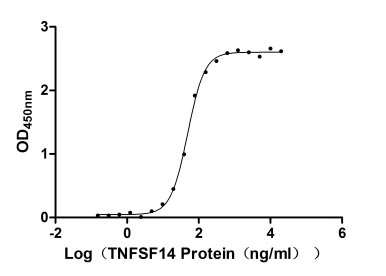
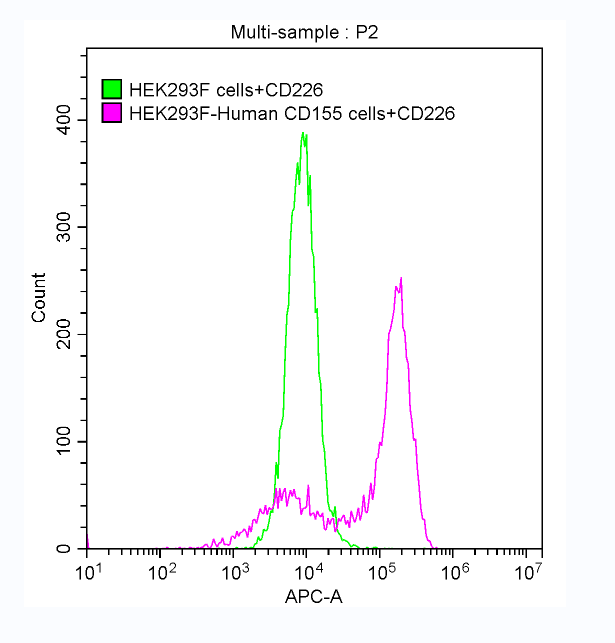
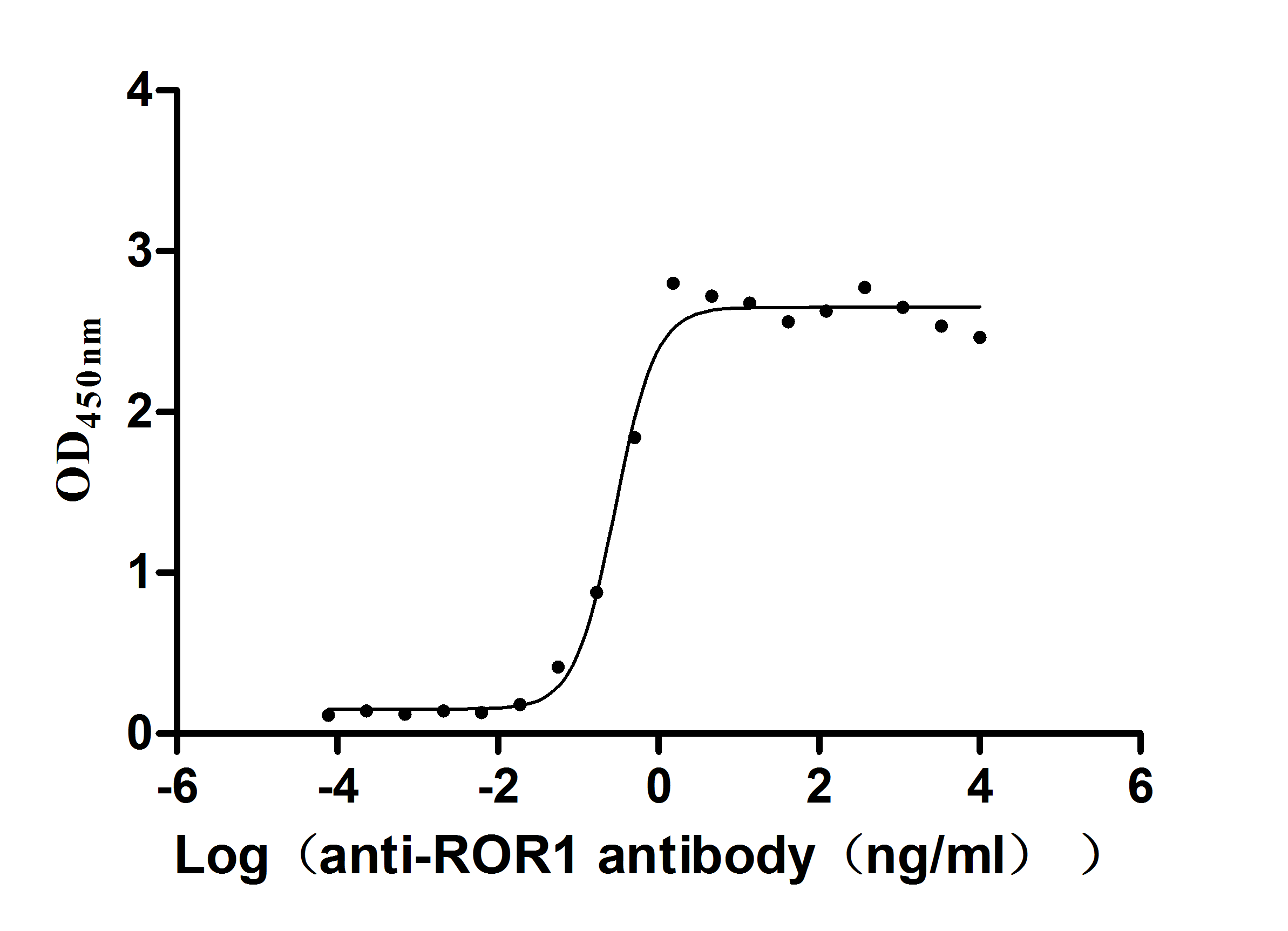
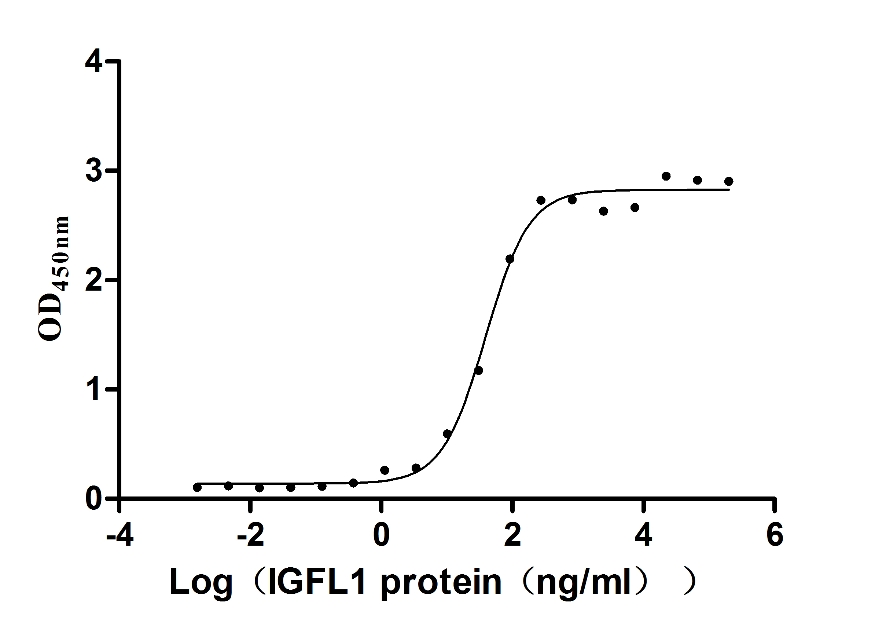
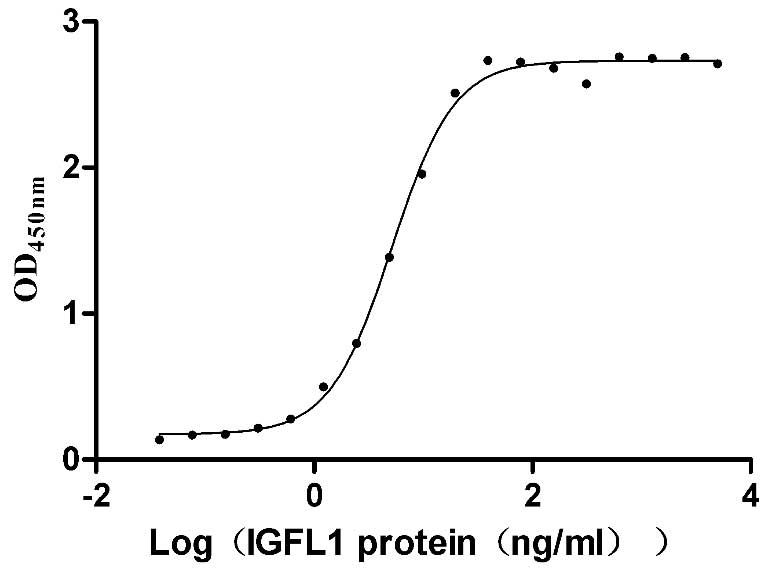

-AC1.jpg)
-AC1.jpg)










